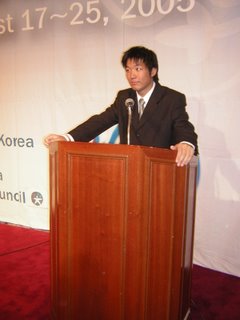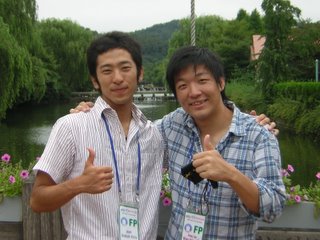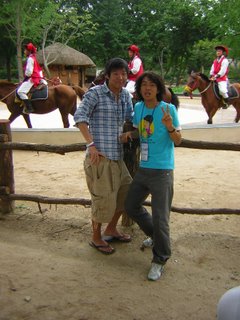Victor's Blog
I'm just a puzzled int'l guy
星期日, 3月 02, 2008
星期六, 2月 23, 2008
星期四, 4月 13, 2006
UN Human Rights Council
Introduction
On March 15, 2006, 170 members states at the United Nations agreed to establish a new Human Rights Council to replace the discredited High Commissioner on Human Rights. According to the Secretary General Kofi Annan, “This gives the United Nations the chance – a much-needed chance – to make a new beginning in its work for human rights around the world.[1]”
Although we now celebrate the coming of a Human Rights Council, looking into the past, the UN High Commissioner on Human Rights has been accused of its incompetence to carry out its work of protecting human rights. The discussion about the criticisms on the High Commissioner on Human Rights will then be provided firstly in this paper.
The newly established Human Rights Council is meant to rectify the ineffectiveness and the political influence in the previous function of the Commission. Therefore, the improved features of the new Council are also key factors to member states’ decision to replace the Commission. The new mechanism invented in the Human Rights Council will also be introduced.
Undoubtedly, the new Human Rights Council is out of the question to be a perfect organization. There are still certain legal and political problems existing in the new human rights body, such as USA’s boycott of the Council’s creation, the exceeding proportion of developing countries in the Council, etc. The further explanation of these problems will be provided in the last section of this paper.
1. Accounts for the Creation of a New Human Rights Organ
In discussing the reasons behind the General Assembly’s decision to establish the Human Rights Council, the paper will firstly scrutinize the criticisms on the former UN High Commissioner on Human Rights, which account mostly for the creation of the new Human Rights Council. Subsequently, the advantages of the newly established Council will be introduced so as to justify the “creation” of a new upgraded organ in charge of the human rights affairs, rather than a moderate reform within the original regime.
(1) The Criticisms on the High Commissioner on Human Rights
The UN High Commissioner on Human Rights has been accused of its malfunction in promoting and protecting international human rights. In general, the causes of this malfunction can be summarized as the following three major points.
a. Member States as Both Judges and Defendants
The member states in the UN High Commissioner on Human rights are often criticized as being judges and defendants at the same time. Several of its member countries themselves have dubious human rights records, including states whose representatives have been elected to chair the commission. The commission has in recent years included countries accused of gross human rights violations such as Sudan, China, Cuba and Zimbabwe[2]. Therefore, activist groups have long expressed a concern for the memberships of the People's Republic of China, Cuba, Zimbabwe, Russia, Saudi Arabia, and Pakistan, and the past memberships of Algeria, Syria, Libya, and Vietnam on the commission. These countries have variously been accused of human rights violations, and the concern is that they will work against resolutions on the commission condemning human rights, thus indirectly promoting despotism and domestic repression. Even worse, the desire of states with problematic human rights records to be elected to the Commission is largely to defend themselves from attacks on their human rights records[3]. Consequently, the dubious human rights records of the member states made the commission suffer from the criticism on its disability to carry out the tasks of promoting global human rights standards.
b. Commission as a Frantic Political Struggle Platform
Aside from some members’ dishonored human rights records, member states have always indulged in their diplomatic games for big political stakes[4]. For instance, countries without support in the commission such as Burma and Burundi often received severe condemnations, whereas Belarus, North Korea and others could manage to escape from condemnations because their allies’ support. If we take a look at another case in May 2001, the United States, which had been a member since the establishment of the body in 1947, was not elected to the Commission. The reason of that may attribute to its lack of sufficient support from European States which were critical of Washington's opposition to the creation of the International Criminal Court. Thus, the political influences over the commission’s decision-making process also severely undermined the credibility of the UN High Commissioner of Human Rights.
c. “Non-action” – A Procedure Used to Maintain Impunity
The existence of a “non-action” motion constitutes most for the Human Rights Commission’s inability to achieve its goal of promoting and protecting human rights. A “non-action” motion is a procedural device designed to avoid a vote on a resolution and to cut short any debate on an embarrassing issue. In other words, any delegation wanting to prevent discussion on a particular matter just has to present a procedural “non-action” motion which must be put to an immediate vote and, if approved, blocks any other proposal. This device has been used systematically by China since the Tienanmen square massacre in 1989 to put a stop to any criticism of its practices. Since then, others have made excessive use of this mechanism to prevent them from being listed on the human rights violator’s agenda[5].
In sum, certain member states’ terrible human rights records, the outrageous political struggle within the Commission, as well as the existence of “non-action” motion in the commission altogether result in the inefficiency of the commission to carry out its original goal. On the other hand, it was also because of the severe criticism on the Human Rights Commission that encouraged the creation of a new human rights body in the United Nations---the Human Rights Council.
(2) The Advantages of the Newly Established Human Rights Council
Compared to the Human Rights Commission, the Human Rights Council works more efficiently by adopting a more comprehensive election mechanism to incorporate more countries into the Council, and also by inventing a universal periodic review mechanism so as to monitor the nations in regard to their human rights records. The following section will give a brief introduction to these two superior mechanisms of the Council to the Human Rights Commission.
a. Improved Election Mechanism
The new election mechanism of the Council showed a major improvement over the Commission. Election to the Council would require an absolute majority of UN member States, with at least 96 out of 191 members supporting a state's membership. This threshold was much higher than the 28 or fewer votes that could get a country membership in the Commission, and would allow countries to block the election of rights violators[6].
Besides, States wishing to be elected to the new Council need to be committed to the protection and promotion human rights. The General Assembly can suspend any of the Council's members that commit gross and systematic violations of human rights.
Owing to the improved election mechanism, countries having records of violating human rights will no longer be admitted to the council as they often did in the Commission.
b. A Universal Periodic Review Mechanism[7]
Besides the improvement of election mechanism, the members are also required to commit themselves to uphold the highest standards of human rights, cooperate fully with the Council, and have their own human rights' records reviewed during their term of membership. The universal review mechanism will allow the Council to hold all member states to their human rights obligations fairly and equally, without selectivity or double standards.
Also, the Council will meet regularly throughout the year, and can hold special sessions when needed. This enables the Human Rights Council to deal with human rights crises immediately as one arises. The review system in the Human Rights Council hence will serve better as a watchdog to ensure countries not violating the standard human rights and not having double standards as they breach any UN human rights resolution.
Together with the improved election system, which incorporates more countries into the Council than the Commission, the universal periodic review system is believed to strengthen the UN’s work on the protection of human rights.
2. Political and Legal Problems of Human Rights Council
(1) The Fundamental Attitude of Nations Has Not Changed
The countries that make up the international community have not changed because of the Human Rights Council invention. In particular, the attitude that human rights is “something that goes wrong somewhere else”, and conversely, that human rights are proscribed by historical, traditional religious values – the old “cultural relativism” argument, still characterize the membership[8]. Therefore, the change from the commission to the Council does not guarantee a fundamental change in countries’ attitudes toward human rights. The effectiveness of the Council, to some extent, still depends on the countries’ willingness to abide by the rules regulated in the Human Rights Council.
(2) The United States’ Boycott
The United States was one of only four countries[9] to vote against the creation of Human Rights Council, arguing that the reform did not go far enough. G.W. Bush also declared that the United States would not seek a seat on the Council, saying it would be more effective from the outside. United States State Department spokesman Sean McCormack said, "We will work closely with partners in the international community to encourage the council to address serious cases of human rights abuse in countries such as Iran, Cuba, Zimbabwe, Burma, Sudan, and North Korea.[10]"
A notorious human rights violator both internationally and domestically in the past decades, the United States can be seen as the most uncertain factor in the Council’s function of protecting human rights. Determined not to be included in the Human Rights Council, its behavior of breaching standards of human rights cannot be fully supervised by the Council. Therefore, despite the claim by the United States to support the Council financially, the international community will not enjoy a inclusive human rights protection system unless the USA is integrated into the Council in the future.
(3) Easier to Get on the Council than to Be Expelled?
The candidates of the Council require a single majority to get elected, but two thirds majority to be suspended. Therefore, if a country in fact violates human rights and is ought to be expelled from the Human Rights Council, as long as it receives a one-third support from its alliances (as human rights violators usually do), it will not be expelled by the Council. This two-thirds votes for expel procedure would still make the determination of punishing human rights violators doubtful in the Council.[11]
(4) The Exceeding Proportion of African & Asian Representation
Despite the fact that the geographic distribution of the new council reflects the geographic distribution of the world and is a fact of international life[12], Asian and African states could form a majority with 26 votes, whereas the rest of the countries have cumulative 21 votes. In other words, in the Asian and African region the Council will need to elect 26 representatives out of a huge number of countries that had bad human rights records. On top of that, the efforts committed by those Asian and African developing countries to enforce the protection of human rights is not clearly seen and guaranteed. Consequently, with too many representatives from regions that are noted for its bad human rights records in the past, the challenge now is to elect Asian and African states which are truly leaders on human rights in their respective regions.
Conclusion
The creation of Human Rights Council is meant to solve the problems which pervaded in the UN High Commissioner of Human Rights. In the Commission, the member states are often criticized as being judges and defendants at the same time. Even countries having worst human rights records can be elected to chair in the Commission. Besides, the Commission is also criticized as a frantic forum for political struggle, rather than a genuine mechanism to protect human rights. Moreover, the existence of “non-action” motion prevents countries with bad human rights conducts from being listed on the sanction agenda.
Because of the above disadvantages of the Commission, an improved system of the Human Rights Council is created. The Council provides a better election mechanism by requiring an absolute majority when it comes to membership. Besides, states wishing to be elected to the new Council need to be committed to the protection and promotion human rights. As to the invention of international periodic review system, it will allow the Council to hold all member states to their human rights obligations fairly and equally, without selectivity or double standards. In sum, I conclude that it was because of both the discredit of the Commission and the improved mechanism of the Council that the General Assembly decided to create the Council.
On the other hand, no human device can be perfect. The Human Rights Council may still encounter some problems in carrying out its goals of protecting human rights. Firstly, the fundamental attitudes of states have not changed because of the creation of the Council. Countries still believe that the case of human rights violation is no huge business. Therefore, the effectiveness of the Council still largely depends on the countries’ willingness to abide by the rules. Secondly, the USA’s boycott of the creation of Human Rights Council symbolized its unwillingness to abide by the international human rights standards (despite its promises to work “outside” with the Council.) Furthermore, on the legal aspects, the almost impossibility (two-thirds votes) to be expelled by the Council made the human rights violator invulnerable to the international pressure. Lastly, the exceeding numbers of African and Asian developing countries, often noted for their dishonorable human rights records, make their commitment to abide by the human rights rules less credible.
In conclusion, the creation of the Human Rights Council is a historic improvement for the human rights protection in the UN framework. The good intention of the states should, of course, be acclaimed. However, we cannot be too naive when we believe that this new body of human rights supervision will solve every problem in relations to human rights violation. After all, the willingness of the states to respect human rights is still the key point to the new design of Human Rights Council.
[1] Secretary-General Office of the Spokesman, “Secretary-General's statement on the Human Rights Council”, 15 March 2006
[2] BBC News, “UN Creates New Human Rights Body”, 15 March 2006
[3] Wikipedia (http://en.wikipedia.org/wiki/United_Nations_Commission_on_Human_Rights#Criticism)
[4] “UN Commission On Human Rights Loses All Credibility—Wheeling and Dealing, Incompetence and Non-Action”, Reporters Without Borders Jean-Claude Buhrer, July 2003, pg. 2
[5]“UN Commission On Human Rights Loses All Credibility—Wheeling and Dealing, Incompetence and Non-Action”, Reporters Without Borders Jean-Claude Buhrer, July 2003, pg. 11
[6] UN Press Release, “HIGH COMMISSIONER FOR HUMAN RIGHTS SALUTES CREATION OF HUMAN RIGHTS COUNCIL”, 15 March 2006
[7] UN General Assembly Agenda items 46 and 120 5(e) states that: Undertake a universal periodic review, based on objective and reliable information, of the fulfilment by each State of its human rights obligations and commitments in a manner which ensures universality of coverage and equal treatment with respect to all States; the review shall be a cooperative mechanism, based on an interactive dialogue, with the full involvement of the country concerned and with consideration given to its capacity-building needs; such a mechanism shall complement and not duplicate the work of treaty bodies; the Council shall develop the modalities and necessary time allocation of the universal periodic review mechanism within one year after the holding of its first session;
[8] John Pace, “The UN Human Rights Council: Opportunities and Challenges”, 3 April
[9] Only the United States, the Marshall Islands, Palau, and Israel voted against the Council's creation
[10] Human Rights Watch, “New Rights Council Needs U.S. Support”, April 6 2006
[11] www.epochtw.com
[12] The 47 seats in the new Council will be distributed among the UN's regional groups as follows: 13 for Africa, 13 for Asia, 6 for Eastern Europe, 8 for Latin America and the Caribbean, and 7 for the Western European and Others Group.
On March 15, 2006, 170 members states at the United Nations agreed to establish a new Human Rights Council to replace the discredited High Commissioner on Human Rights. According to the Secretary General Kofi Annan, “This gives the United Nations the chance – a much-needed chance – to make a new beginning in its work for human rights around the world.[1]”
Although we now celebrate the coming of a Human Rights Council, looking into the past, the UN High Commissioner on Human Rights has been accused of its incompetence to carry out its work of protecting human rights. The discussion about the criticisms on the High Commissioner on Human Rights will then be provided firstly in this paper.
The newly established Human Rights Council is meant to rectify the ineffectiveness and the political influence in the previous function of the Commission. Therefore, the improved features of the new Council are also key factors to member states’ decision to replace the Commission. The new mechanism invented in the Human Rights Council will also be introduced.
Undoubtedly, the new Human Rights Council is out of the question to be a perfect organization. There are still certain legal and political problems existing in the new human rights body, such as USA’s boycott of the Council’s creation, the exceeding proportion of developing countries in the Council, etc. The further explanation of these problems will be provided in the last section of this paper.
1. Accounts for the Creation of a New Human Rights Organ
In discussing the reasons behind the General Assembly’s decision to establish the Human Rights Council, the paper will firstly scrutinize the criticisms on the former UN High Commissioner on Human Rights, which account mostly for the creation of the new Human Rights Council. Subsequently, the advantages of the newly established Council will be introduced so as to justify the “creation” of a new upgraded organ in charge of the human rights affairs, rather than a moderate reform within the original regime.
(1) The Criticisms on the High Commissioner on Human Rights
The UN High Commissioner on Human Rights has been accused of its malfunction in promoting and protecting international human rights. In general, the causes of this malfunction can be summarized as the following three major points.
a. Member States as Both Judges and Defendants
The member states in the UN High Commissioner on Human rights are often criticized as being judges and defendants at the same time. Several of its member countries themselves have dubious human rights records, including states whose representatives have been elected to chair the commission. The commission has in recent years included countries accused of gross human rights violations such as Sudan, China, Cuba and Zimbabwe[2]. Therefore, activist groups have long expressed a concern for the memberships of the People's Republic of China, Cuba, Zimbabwe, Russia, Saudi Arabia, and Pakistan, and the past memberships of Algeria, Syria, Libya, and Vietnam on the commission. These countries have variously been accused of human rights violations, and the concern is that they will work against resolutions on the commission condemning human rights, thus indirectly promoting despotism and domestic repression. Even worse, the desire of states with problematic human rights records to be elected to the Commission is largely to defend themselves from attacks on their human rights records[3]. Consequently, the dubious human rights records of the member states made the commission suffer from the criticism on its disability to carry out the tasks of promoting global human rights standards.
b. Commission as a Frantic Political Struggle Platform
Aside from some members’ dishonored human rights records, member states have always indulged in their diplomatic games for big political stakes[4]. For instance, countries without support in the commission such as Burma and Burundi often received severe condemnations, whereas Belarus, North Korea and others could manage to escape from condemnations because their allies’ support. If we take a look at another case in May 2001, the United States, which had been a member since the establishment of the body in 1947, was not elected to the Commission. The reason of that may attribute to its lack of sufficient support from European States which were critical of Washington's opposition to the creation of the International Criminal Court. Thus, the political influences over the commission’s decision-making process also severely undermined the credibility of the UN High Commissioner of Human Rights.
c. “Non-action” – A Procedure Used to Maintain Impunity
The existence of a “non-action” motion constitutes most for the Human Rights Commission’s inability to achieve its goal of promoting and protecting human rights. A “non-action” motion is a procedural device designed to avoid a vote on a resolution and to cut short any debate on an embarrassing issue. In other words, any delegation wanting to prevent discussion on a particular matter just has to present a procedural “non-action” motion which must be put to an immediate vote and, if approved, blocks any other proposal. This device has been used systematically by China since the Tienanmen square massacre in 1989 to put a stop to any criticism of its practices. Since then, others have made excessive use of this mechanism to prevent them from being listed on the human rights violator’s agenda[5].
In sum, certain member states’ terrible human rights records, the outrageous political struggle within the Commission, as well as the existence of “non-action” motion in the commission altogether result in the inefficiency of the commission to carry out its original goal. On the other hand, it was also because of the severe criticism on the Human Rights Commission that encouraged the creation of a new human rights body in the United Nations---the Human Rights Council.
(2) The Advantages of the Newly Established Human Rights Council
Compared to the Human Rights Commission, the Human Rights Council works more efficiently by adopting a more comprehensive election mechanism to incorporate more countries into the Council, and also by inventing a universal periodic review mechanism so as to monitor the nations in regard to their human rights records. The following section will give a brief introduction to these two superior mechanisms of the Council to the Human Rights Commission.
a. Improved Election Mechanism
The new election mechanism of the Council showed a major improvement over the Commission. Election to the Council would require an absolute majority of UN member States, with at least 96 out of 191 members supporting a state's membership. This threshold was much higher than the 28 or fewer votes that could get a country membership in the Commission, and would allow countries to block the election of rights violators[6].
Besides, States wishing to be elected to the new Council need to be committed to the protection and promotion human rights. The General Assembly can suspend any of the Council's members that commit gross and systematic violations of human rights.
Owing to the improved election mechanism, countries having records of violating human rights will no longer be admitted to the council as they often did in the Commission.
b. A Universal Periodic Review Mechanism[7]
Besides the improvement of election mechanism, the members are also required to commit themselves to uphold the highest standards of human rights, cooperate fully with the Council, and have their own human rights' records reviewed during their term of membership. The universal review mechanism will allow the Council to hold all member states to their human rights obligations fairly and equally, without selectivity or double standards.
Also, the Council will meet regularly throughout the year, and can hold special sessions when needed. This enables the Human Rights Council to deal with human rights crises immediately as one arises. The review system in the Human Rights Council hence will serve better as a watchdog to ensure countries not violating the standard human rights and not having double standards as they breach any UN human rights resolution.
Together with the improved election system, which incorporates more countries into the Council than the Commission, the universal periodic review system is believed to strengthen the UN’s work on the protection of human rights.
2. Political and Legal Problems of Human Rights Council
(1) The Fundamental Attitude of Nations Has Not Changed
The countries that make up the international community have not changed because of the Human Rights Council invention. In particular, the attitude that human rights is “something that goes wrong somewhere else”, and conversely, that human rights are proscribed by historical, traditional religious values – the old “cultural relativism” argument, still characterize the membership[8]. Therefore, the change from the commission to the Council does not guarantee a fundamental change in countries’ attitudes toward human rights. The effectiveness of the Council, to some extent, still depends on the countries’ willingness to abide by the rules regulated in the Human Rights Council.
(2) The United States’ Boycott
The United States was one of only four countries[9] to vote against the creation of Human Rights Council, arguing that the reform did not go far enough. G.W. Bush also declared that the United States would not seek a seat on the Council, saying it would be more effective from the outside. United States State Department spokesman Sean McCormack said, "We will work closely with partners in the international community to encourage the council to address serious cases of human rights abuse in countries such as Iran, Cuba, Zimbabwe, Burma, Sudan, and North Korea.[10]"
A notorious human rights violator both internationally and domestically in the past decades, the United States can be seen as the most uncertain factor in the Council’s function of protecting human rights. Determined not to be included in the Human Rights Council, its behavior of breaching standards of human rights cannot be fully supervised by the Council. Therefore, despite the claim by the United States to support the Council financially, the international community will not enjoy a inclusive human rights protection system unless the USA is integrated into the Council in the future.
(3) Easier to Get on the Council than to Be Expelled?
The candidates of the Council require a single majority to get elected, but two thirds majority to be suspended. Therefore, if a country in fact violates human rights and is ought to be expelled from the Human Rights Council, as long as it receives a one-third support from its alliances (as human rights violators usually do), it will not be expelled by the Council. This two-thirds votes for expel procedure would still make the determination of punishing human rights violators doubtful in the Council.[11]
(4) The Exceeding Proportion of African & Asian Representation
Despite the fact that the geographic distribution of the new council reflects the geographic distribution of the world and is a fact of international life[12], Asian and African states could form a majority with 26 votes, whereas the rest of the countries have cumulative 21 votes. In other words, in the Asian and African region the Council will need to elect 26 representatives out of a huge number of countries that had bad human rights records. On top of that, the efforts committed by those Asian and African developing countries to enforce the protection of human rights is not clearly seen and guaranteed. Consequently, with too many representatives from regions that are noted for its bad human rights records in the past, the challenge now is to elect Asian and African states which are truly leaders on human rights in their respective regions.
Conclusion
The creation of Human Rights Council is meant to solve the problems which pervaded in the UN High Commissioner of Human Rights. In the Commission, the member states are often criticized as being judges and defendants at the same time. Even countries having worst human rights records can be elected to chair in the Commission. Besides, the Commission is also criticized as a frantic forum for political struggle, rather than a genuine mechanism to protect human rights. Moreover, the existence of “non-action” motion prevents countries with bad human rights conducts from being listed on the sanction agenda.
Because of the above disadvantages of the Commission, an improved system of the Human Rights Council is created. The Council provides a better election mechanism by requiring an absolute majority when it comes to membership. Besides, states wishing to be elected to the new Council need to be committed to the protection and promotion human rights. As to the invention of international periodic review system, it will allow the Council to hold all member states to their human rights obligations fairly and equally, without selectivity or double standards. In sum, I conclude that it was because of both the discredit of the Commission and the improved mechanism of the Council that the General Assembly decided to create the Council.
On the other hand, no human device can be perfect. The Human Rights Council may still encounter some problems in carrying out its goals of protecting human rights. Firstly, the fundamental attitudes of states have not changed because of the creation of the Council. Countries still believe that the case of human rights violation is no huge business. Therefore, the effectiveness of the Council still largely depends on the countries’ willingness to abide by the rules. Secondly, the USA’s boycott of the creation of Human Rights Council symbolized its unwillingness to abide by the international human rights standards (despite its promises to work “outside” with the Council.) Furthermore, on the legal aspects, the almost impossibility (two-thirds votes) to be expelled by the Council made the human rights violator invulnerable to the international pressure. Lastly, the exceeding numbers of African and Asian developing countries, often noted for their dishonorable human rights records, make their commitment to abide by the human rights rules less credible.
In conclusion, the creation of the Human Rights Council is a historic improvement for the human rights protection in the UN framework. The good intention of the states should, of course, be acclaimed. However, we cannot be too naive when we believe that this new body of human rights supervision will solve every problem in relations to human rights violation. After all, the willingness of the states to respect human rights is still the key point to the new design of Human Rights Council.
[1] Secretary-General Office of the Spokesman, “Secretary-General's statement on the Human Rights Council”, 15 March 2006
[2] BBC News, “UN Creates New Human Rights Body”, 15 March 2006
[3] Wikipedia (http://en.wikipedia.org/wiki/United_Nations_Commission_on_Human_Rights#Criticism)
[4] “UN Commission On Human Rights Loses All Credibility—Wheeling and Dealing, Incompetence and Non-Action”, Reporters Without Borders Jean-Claude Buhrer, July 2003, pg. 2
[5]“UN Commission On Human Rights Loses All Credibility—Wheeling and Dealing, Incompetence and Non-Action”, Reporters Without Borders Jean-Claude Buhrer, July 2003, pg. 11
[6] UN Press Release, “HIGH COMMISSIONER FOR HUMAN RIGHTS SALUTES CREATION OF HUMAN RIGHTS COUNCIL”, 15 March 2006
[7] UN General Assembly Agenda items 46 and 120 5(e) states that: Undertake a universal periodic review, based on objective and reliable information, of the fulfilment by each State of its human rights obligations and commitments in a manner which ensures universality of coverage and equal treatment with respect to all States; the review shall be a cooperative mechanism, based on an interactive dialogue, with the full involvement of the country concerned and with consideration given to its capacity-building needs; such a mechanism shall complement and not duplicate the work of treaty bodies; the Council shall develop the modalities and necessary time allocation of the universal periodic review mechanism within one year after the holding of its first session;
[8] John Pace, “The UN Human Rights Council: Opportunities and Challenges”, 3 April
[9] Only the United States, the Marshall Islands, Palau, and Israel voted against the Council's creation
[10] Human Rights Watch, “New Rights Council Needs U.S. Support”, April 6 2006
[11] www.epochtw.com
[12] The 47 seats in the new Council will be distributed among the UN's regional groups as follows: 13 for Africa, 13 for Asia, 6 for Eastern Europe, 8 for Latin America and the Caribbean, and 7 for the Western European and Others Group.
星期四, 1月 26, 2006
公共選擇之集體決策與交互成本理論---以聯合國之成立與其投票規則為例
1. 前言
Buchanan在The Calculus of Consent書中第五章曾提到國內政治組織形成的原因,是由於個體認為集體決策較私人決策更可以增加他的效用,並減少私人決策所帶來的外部性。而聯合國的形成,正是由於主權獨立的國家間,在經過兩次世界大戰的慘痛教訓後,所欲嘗試的國際間集體決策機制,以防止國家恣意行為造成全體國家的外部性。藉由Buchanan提出的公共選擇理論來比較國內政府的形成與聯合國的建立,以及他們所採取的投票規則,似乎可以發現其間相當大的關聯性。因此,本報告希望應用書中對於集體決策方式與國內政治組織形成之分析,來檢視聯合國的形成以及聯合國組織中所採取的投票規則。
本報告首先介紹公共選擇理論中的集體決策以及交互成本理論,並以其作為本報告主要的分析工具,分別將從外部成本、協調成本、以及垂直加總得出之交互成本函數圖形三者來討論。接著簡述聯合國成立的背景以及目標,以及聯合國大會與安全理事會各自的投票機制。最後利用公共選擇理論與國際關係理論方法論上之共同處,分析聯合國的成立在公共選擇上之意義,以及聯合國大會與安理會投票機制中交互成本概念的應用。
2. 公共選擇理論中的集體決策以及交互成本理論
當個體認為集體決策行動會使他所需承擔的成本最小時,個體將會加入進行此決策之政治組織。個人是否會將特定事務交由公共部門來運作,是由成本效益分析來決定的。在效益面上,以政治組織帶來淨外部成本之消除為考量;在成本面上以組織帶來的決策成本為參考標準。藉此,Buchanan在第5章提出兩項決定政治組織的要素。首先是外部成本(External Costs), 也就是一個體在政治組織中所認為其他個體行為可能為他帶來的外部成本。其次是決策成本(Decision-making Costs),即參與組織活動所帶來的協調成本。將兩者加總會得到交互成本(Interdependence costs),當一項集體決策活動使得此項成本降為最低時,個體便會決定採取此項集體決策。
此外,個人面對外部性時,協調成本是不同制度會被採用的主要因素,若是沒有協調成本,個體會用自發性的合作方式來解決外部性,公部門便不會存在。有趣的是,公部門是為了消除外部性而生,但有時公共決策的結果卻會對部分的個人產生外部性。
進一步而言,一個政治組織的形成方式與組織中所採取的決策規則是息息相關的。作者在第6章討論公共事務的性質時,分別提出了外部成本、決策成本、以及兩者加總所得出的交互成本函數。三者用以說明個體決定決策規則為一致決、多數決、或是其他比例表決的過程。
(1) 外部成本函數(External Costs Function)
Figure 1 外部成本函數外部成本函數(Figure 1)是對於參與某項集體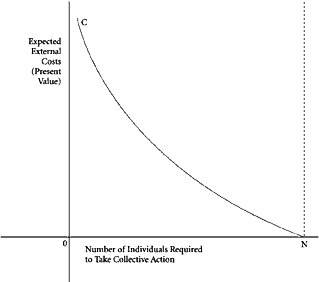 活動的個人而言,預期由於其他人的行動所使其承受的成本,與達成協議人數的函數關係。從函數圖形兩側來看,圖形的左側代表當決策規則是由較少數的人決定時,則容易使得決策結果造成個體較大的外部成本;相反地,圖形右側顯示當決策規則需要全體一致同意時,個人預期外部成本則為零。整體來說,決策過程需要越多人同意時,決策結果越容易產生較小的外部性。外部成本函數因而呈現遞減的趨勢。
活動的個人而言,預期由於其他人的行動所使其承受的成本,與達成協議人數的函數關係。從函數圖形兩側來看,圖形的左側代表當決策規則是由較少數的人決定時,則容易使得決策結果造成個體較大的外部成本;相反地,圖形右側顯示當決策規則需要全體一致同意時,個人預期外部成本則為零。整體來說,決策過程需要越多人同意時,決策結果越容易產生較小的外部性。外部成本函數因而呈現遞減的趨勢。
(2)
Figure 2 決策成本函數決策成本函數(Decision-making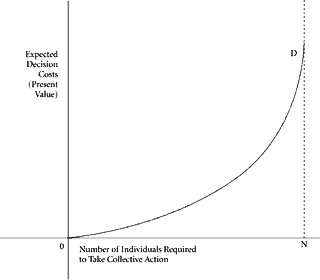 Costs Function)
Costs Function)
決策成本函數(Figure 2)顯示兩個以上的個體欲達成一致的決議,所需花費的時間與精力的成本,隨著達成一致所需的群體規模擴大而逐漸增加。分別從函數圖形的兩側來看,當參與決策人數相對較少時,這時的決策成本相對較低;當需要全體一致決才能構成集體行動時,由於任何一人的否決便可能使得某些決議不得通過,因此預期的決策成本也急速上升。
(3) 最佳決策規則的選擇──交互成本函數(Interdependence Costs Function)
當一個理性個體希望某一決策可將其效用極大化時,他必定會希望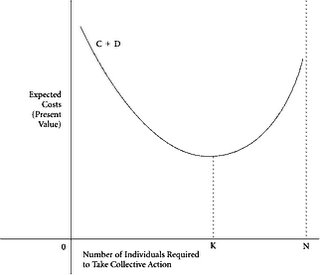 決策規則將外部性最小化,並同時也將決策成本最小化。我們將外部成本函數與決策成本函數做垂直加總,得出交互成本函數(Figure 3),並可觀察到一最低預期均衡交互成本,即K/N所對應之最小成本。比較函數圖形的左右兩側,若決策人數較少時,由於少數人決策所可能產生之外部成本會遠高過於其減低的協調成本,邊際外部成本上升率高於邊際決策成本降低率,故決策規則由K/N移往較少個體決策規則時,交互成本會呈現遞增的趨勢;若趨近於一致決時,儘管外部成本可藉由一致決降為零,但由於溝通成本過大,且每個人都擁有否決權,故邊際外部成本下降率不及邊際決策成本上升率,故決策人數由K/N移往N/N時,交互成本亦呈現遞增趨勢。
決策規則將外部性最小化,並同時也將決策成本最小化。我們將外部成本函數與決策成本函數做垂直加總,得出交互成本函數(Figure 3),並可觀察到一最低預期均衡交互成本,即K/N所對應之最小成本。比較函數圖形的左右兩側,若決策人數較少時,由於少數人決策所可能產生之外部成本會遠高過於其減低的協調成本,邊際外部成本上升率高於邊際決策成本降低率,故決策規則由K/N移往較少個體決策規則時,交互成本會呈現遞增的趨勢;若趨近於一致決時,儘管外部成本可藉由一致決降為零,但由於溝通成本過大,且每個人都擁有否決權,故邊際外部成本下降率不及邊際決策成本上升率,故決策人數由K/N移往N/N時,交互成本亦呈現遞增趨勢。
Figure 3 交互成本函數
簡單來說,個體認為最適或是最有效率的決策規則,經由外部成本與決策成本的加總衡量後,將會由圖三中的均衡K/N點決定,並且預期會位於交互成本最低的狀況。
(4) 小結
一方面來說,個體通常認為任何對他行為的限制都會對其加諸額外的成本。就另一方面來說,他也體認到其他個體的恣意行為亦會對他造成外部性。由於後者情形較容易發生,理性行為者便會傾向於試圖利用公共選擇過程降低私人行動對他產生的外部性。而要完全消除外部性,只有採取一致決的規則,使得所有個體採取行動之前必定須要透過其他個體的同意。
然而,他卻需要考慮到,在較小的團體之中達成共識或一致決是較容易的,但在規模較大的團體中由於討價還價和協調的過程較複雜,所帶來的協調成本往往大過於個體願意付擔的。故一理性行為者在決定採取較接近一致決的規則時,事實上便是藉由自願性協調成本之增加來換取防止其他個體做出不利於己的決策;相對來說,當一個理性行為者在決定採取少於一致決的決策規則時,事實上是用較低的決策成本來換取可能產生的額外外部性。
3. 聯合國之成立與大會及安理會之投票規則
(1) 聯合國之成立
在第二次世界大戰尚未結束時,「欲免後世再遭今代人類兩度身歷慘不堪言之戰禍」已成為各國政治家思考的重要問題。1945年6月26日,50個國家的代表在美國舊金山簽署了《聯合國憲章》。同年10月24日,《聯合國憲章》生效,聯合國正式成立。聯合國代表著主權國家間欲建立一個和平、發展、合作世界的美好理想,代表著各國政府對多邊主義和集體行動的承諾,在歷史上幾乎與幾千年前人類形成國家政治組織具有同樣重要的意義。
維護國際和平與國際安全是聯合國的首要宗旨。然而,對一個真正有效的國際組織來說,只是防止戰爭和侵略是不夠的。因此,發展各國間友好關係、促進國際合作、協調各國行動也成為聯合國的宗旨。《聯合國憲章》還確定了各國主權平等、和平解決爭端、不干涉內政、集體安全等原則。聯合國總體上為維護世界和平與集體安全、促進共同發展發揮了不可替代的作用,是人類在國家體系上試圖建構一個集體決策機構的革命性嘗試。
(2) 大會投票規則
聯合國大會在程序性議題以過半數投票規則表決之。但聯合國憲章第四章第 18 條規定,對於「重要問題」(Important Question)之決議應以到會及投票之會員國三分之二多數決定之。所謂「重要問題」包括有:
(a) 關於維持國際和平及安全之建議
(b) 安全理事會非常任理事國之選舉
(c) 經濟暨社會理事會理事國之選舉
(d) 對於新會員國加入聯合國之准?(e) 會員國權利及特權之停止,會員國之除名
(f) 預算問題等。
(3) 安全理事會投票規則
聯合國安理會目前由五個常任理事國及十個非常任理事國組成,共分為兩種投票規則適用。根據憲章第五章27條第2款規定,在程序性事項(Procedural Matters)投票之決議下,須經九國同意後通過(五分之三同意);又根據27條第3款規定,安全理事會對於實質性事項/非程序性事項(Substantive Matters/Non-Procedural Matters)之決議,應以九理事國之可決票,包括全體常任理事國之同意票表決之。也就是說,此類實質性事項之決議需要五個常任理事國的一致決才可通過,故五位常任理事國享有議案否決權(Veto)。實質性決議事項包括:
(a) 審查國際爭端
(b) 判決與推薦上述國際爭端的解決之道
(c) 制訂常規武器的計劃與制度
(d) 研判威脅和平與侵略事件並推薦解決之道
(e) 呼籲成員國實行經濟制裁等非暴力手段,以制止侵略者
(f) 對侵略者采取軍事行動
(g) 推薦新成員國加入聯合國等。
4. 以公共選擇交互成本理論分析聯合國之成立與其投票規則
(1) 公共選擇之方法論與國際關係現實主義理論基礎之關聯
公共選擇理論主要採取方法論上的個體主義為分析基礎,也就是在分析個體行為時,從個體自利的角度出發,而非從社會結構面對個體的影響著手。傳統國際關係現實主義亦主張,國家們對於權力與國家利益的追求是構成國際關係與國家行為的基礎。比較兩者方法論上的共通性,吾人因此認為公共選擇理論在國際關係與國家行為的應用上,具有某種程度的可適用性。
(2) 聯合國的成立之公共選擇意義
The Calculus of Consent 書中所討論到政府以及社會契約的形成,以及個體為了降低外部性所採取的集體決策行動,與聯合國之成立背景和國家所欲達成之集體安全之行為亦有許多共通性。
首先,不論是國內政府的建立,或是主權國家層級之上聯合國的建立,都是個體從無政府狀態治理邁向統一政治組織管理的過程。(儘管聯合國尚無法被視為國際政府,然而其在某些集體安全功能上的確扮演著國家間集體決策的機構,可被視為當然的國際政治組織。)因此,我們在某種程度上可以將二十世紀初人類在國際層次建立之集體管理機制,與人類原始政治組織的形成作一番類比。
其次,以公共選擇的角度來看,個體通常認為任何對他行為的限制都會對其加諸額外的成本,但他也體認到其他個體的恣意行為亦會對他造成外部性,故會傾向利用集體決策過程降低此一外部性;從國際關係來看,在無政府狀態下國家認定其主權至高無上,其他國家無權干預其行為,但卻也同時認知到某些國家的單邊行為可能對他帶來莫大的傷害。國際條約以及國際戰略盟約的簽定,以及國際組織的建立,便是降低此種外部成本的方式。然而雙邊或少數多邊協定並無法完全地抑制某些國家的侵略性行為,故建立聯合國並實行集體安全制度,便是將全世界所有國家完全囊括在此集體決策規範下,所有國家一致地遵從不侵犯他國的遊戲規則,藉此相互確保其自身安全。因此,個體在國內欲藉由政治組織消除他人所帶來外部性的行為,與國家利用聯合國集體安全制度進而保障其不受他國侵害的行為,幾乎立基點完全相同。
最後,在公共選擇理論中提到,雖然公部門是為了消除外部性而生,但有時公共決策的結果卻會對部分的個人產生外部性。應用到國際關係上,聯合國或是其他國際建制(International Regime),根本上便是限制了國家的主權,使得國家必須犧牲主權換取集體安全與合作,亦可視為聯合國建立所帶來的外部性。聯合國組織所帶來的限制與外部性,尤其是對於那些霸權國家造成的影響最大。
總而言之,從公共選擇的角度來看聯合國的形成以及其功能,我們可以發現聯合國可被視為國際層次的政治集體管理組織,且其在國際安全的維持上,使得某些國家單邊行為帶來的國際社會外部成本得以被避免,但聯合國組織的本身,的確造成對於國家主權的限制,尤其就霸權國家而言。
(3) 大會與安理會投票機制分析
簡單來說,聯合國大會的投票機制,除了少數重要問題(Important Question)外,大致上以多數決作為投票表決機制;安全理事會的投票機制,相對而言除了少數程序性議題採取3/5多數決外,傾向於一致決與多數決混合制(也就是需要有五個常任理事國一致決以及3/5的多數決)。以下將利用交互成本的概念,分別針對安理會與大會投票規則作分析。
聯合國大會所構成的決議案多為建議以及宣示性質,故從外部成本來看,決議之內容並不容易對於會員國本身造成太大的影響,邊際外部成本較小。而聯合國大會是由191個會員國組成,成員間互相磋商的成本較大,除了因人數過多外,亦包括語言溝通障礙、國家利益衝突等,因此決策成本對於交互成本的邊際影響力很大。綜和考量邊際外部成本以及邊際決策成本後,決策成本方面對於最終交互成本的影響力較大,故投票機制將比較不會傾向於一致決,以避免浪費過多的決策成本。
然而,當遇到關於維持國際和平及安全之建議、對於新會員國加入聯合國之准許、以及預算問題等「重要問題」Important Question時,決議的結果所產生的邊際外部成本將大幅增加,因而使得國家必須增加一部份的協調成本用來交換重要問題所產生的外部成本。故投票機制由原先的過半數多數決向一致決方向移動(以圖3為例,從k/n移往n/n,並落在兩者之間),使得表決結果最終成為2/3多數決。
就安理會而言,其所構成之決議案通常都會牽涉到重大的國際安全重要行動或是經濟制裁等,且安理會所採取的行動必定需要五個常任理事國的經濟上或支持才可能實行,其決策結果容易產生極具規模的外部成本,故邊際外部成本的影響力非常大。另一方面,從決策參與人數來看,安理會的成員只有十五名,故邊際決策成本的影響力可說是相當小。將兩者加總,可以發現邊際外部成本較容易影響最終的交互成本,故投票結果需要3/5多數以及5位常任理事國的同意,相當接近於一致決,以避免簡單多數決所可能帶來的過大外部成本。
總的來說,當決策外部成本影響愈大、且決策人數與協調成本影響較少時,比較能夠採取近似於一致決的投票方式,如安理會3/5以及聯合國大會重要問題2/3的投票規則;反之,當外部成本影響愈小、且決策人數與協調成本影響較大時,比較會採行少於一致決(Less than Unanimity)的投票規則,例如聯合國大會之一般決議案之過半數規則。
5. 結論
不論是依照公共選擇理論還是國際關係現實主義的國家利益原則來看,聯合國絕非因為國家追求世界和平的理想而產生。相反地,聯合國機制的出現,顯然是由於國家基於二次大戰的歷史教訓,希望避免過度的權力意志行為導致自身毀滅的結果。公共選擇所採取方法論上的個體基礎因此對於國際關係亦有相同的適用。另外,就聯合國大會與安理會投票機制的選擇上,利用公共選擇理論提出的交互成本概念來檢視,可得到相當有趣且較政治理論更為精確的分析。本報告因此嘗試藉由整合本學期所學之公共選擇理論以及以往政治系所學之國際關係理論,對聯合國的成立以及其投票機制作出跨學科之比較解釋分析。
參考資料
A. Leroy Bennet and James K. Oliver, International Organization: Principles and Issues 7th Edtion, Prentice Hall
James M. Buchanan and Gordon Tullock, The Calculus of Consent: Logical Foundations of Constitutional Democracy, Ann Arbor Paperbacks The University of Michigan Press
The United Nations Charter (http://www.un.org/aboutun/charter)
Buchanan在The Calculus of Consent書中第五章曾提到國內政治組織形成的原因,是由於個體認為集體決策較私人決策更可以增加他的效用,並減少私人決策所帶來的外部性。而聯合國的形成,正是由於主權獨立的國家間,在經過兩次世界大戰的慘痛教訓後,所欲嘗試的國際間集體決策機制,以防止國家恣意行為造成全體國家的外部性。藉由Buchanan提出的公共選擇理論來比較國內政府的形成與聯合國的建立,以及他們所採取的投票規則,似乎可以發現其間相當大的關聯性。因此,本報告希望應用書中對於集體決策方式與國內政治組織形成之分析,來檢視聯合國的形成以及聯合國組織中所採取的投票規則。
本報告首先介紹公共選擇理論中的集體決策以及交互成本理論,並以其作為本報告主要的分析工具,分別將從外部成本、協調成本、以及垂直加總得出之交互成本函數圖形三者來討論。接著簡述聯合國成立的背景以及目標,以及聯合國大會與安全理事會各自的投票機制。最後利用公共選擇理論與國際關係理論方法論上之共同處,分析聯合國的成立在公共選擇上之意義,以及聯合國大會與安理會投票機制中交互成本概念的應用。
2. 公共選擇理論中的集體決策以及交互成本理論
當個體認為集體決策行動會使他所需承擔的成本最小時,個體將會加入進行此決策之政治組織。個人是否會將特定事務交由公共部門來運作,是由成本效益分析來決定的。在效益面上,以政治組織帶來淨外部成本之消除為考量;在成本面上以組織帶來的決策成本為參考標準。藉此,Buchanan在第5章提出兩項決定政治組織的要素。首先是外部成本(External Costs), 也就是一個體在政治組織中所認為其他個體行為可能為他帶來的外部成本。其次是決策成本(Decision-making Costs),即參與組織活動所帶來的協調成本。將兩者加總會得到交互成本(Interdependence costs),當一項集體決策活動使得此項成本降為最低時,個體便會決定採取此項集體決策。
此外,個人面對外部性時,協調成本是不同制度會被採用的主要因素,若是沒有協調成本,個體會用自發性的合作方式來解決外部性,公部門便不會存在。有趣的是,公部門是為了消除外部性而生,但有時公共決策的結果卻會對部分的個人產生外部性。
進一步而言,一個政治組織的形成方式與組織中所採取的決策規則是息息相關的。作者在第6章討論公共事務的性質時,分別提出了外部成本、決策成本、以及兩者加總所得出的交互成本函數。三者用以說明個體決定決策規則為一致決、多數決、或是其他比例表決的過程。
(1) 外部成本函數(External Costs Function)
Figure 1 外部成本函數外部成本函數(Figure 1)是對於參與某項集體
 活動的個人而言,預期由於其他人的行動所使其承受的成本,與達成協議人數的函數關係。從函數圖形兩側來看,圖形的左側代表當決策規則是由較少數的人決定時,則容易使得決策結果造成個體較大的外部成本;相反地,圖形右側顯示當決策規則需要全體一致同意時,個人預期外部成本則為零。整體來說,決策過程需要越多人同意時,決策結果越容易產生較小的外部性。外部成本函數因而呈現遞減的趨勢。
活動的個人而言,預期由於其他人的行動所使其承受的成本,與達成協議人數的函數關係。從函數圖形兩側來看,圖形的左側代表當決策規則是由較少數的人決定時,則容易使得決策結果造成個體較大的外部成本;相反地,圖形右側顯示當決策規則需要全體一致同意時,個人預期外部成本則為零。整體來說,決策過程需要越多人同意時,決策結果越容易產生較小的外部性。外部成本函數因而呈現遞減的趨勢。(2)
Figure 2 決策成本函數決策成本函數(Decision-making
 Costs Function)
Costs Function)決策成本函數(Figure 2)顯示兩個以上的個體欲達成一致的決議,所需花費的時間與精力的成本,隨著達成一致所需的群體規模擴大而逐漸增加。分別從函數圖形的兩側來看,當參與決策人數相對較少時,這時的決策成本相對較低;當需要全體一致決才能構成集體行動時,由於任何一人的否決便可能使得某些決議不得通過,因此預期的決策成本也急速上升。
(3) 最佳決策規則的選擇──交互成本函數(Interdependence Costs Function)
當一個理性個體希望某一決策可將其效用極大化時,他必定會希望
 決策規則將外部性最小化,並同時也將決策成本最小化。我們將外部成本函數與決策成本函數做垂直加總,得出交互成本函數(Figure 3),並可觀察到一最低預期均衡交互成本,即K/N所對應之最小成本。比較函數圖形的左右兩側,若決策人數較少時,由於少數人決策所可能產生之外部成本會遠高過於其減低的協調成本,邊際外部成本上升率高於邊際決策成本降低率,故決策規則由K/N移往較少個體決策規則時,交互成本會呈現遞增的趨勢;若趨近於一致決時,儘管外部成本可藉由一致決降為零,但由於溝通成本過大,且每個人都擁有否決權,故邊際外部成本下降率不及邊際決策成本上升率,故決策人數由K/N移往N/N時,交互成本亦呈現遞增趨勢。
決策規則將外部性最小化,並同時也將決策成本最小化。我們將外部成本函數與決策成本函數做垂直加總,得出交互成本函數(Figure 3),並可觀察到一最低預期均衡交互成本,即K/N所對應之最小成本。比較函數圖形的左右兩側,若決策人數較少時,由於少數人決策所可能產生之外部成本會遠高過於其減低的協調成本,邊際外部成本上升率高於邊際決策成本降低率,故決策規則由K/N移往較少個體決策規則時,交互成本會呈現遞增的趨勢;若趨近於一致決時,儘管外部成本可藉由一致決降為零,但由於溝通成本過大,且每個人都擁有否決權,故邊際外部成本下降率不及邊際決策成本上升率,故決策人數由K/N移往N/N時,交互成本亦呈現遞增趨勢。Figure 3 交互成本函數
簡單來說,個體認為最適或是最有效率的決策規則,經由外部成本與決策成本的加總衡量後,將會由圖三中的均衡K/N點決定,並且預期會位於交互成本最低的狀況。
(4) 小結
一方面來說,個體通常認為任何對他行為的限制都會對其加諸額外的成本。就另一方面來說,他也體認到其他個體的恣意行為亦會對他造成外部性。由於後者情形較容易發生,理性行為者便會傾向於試圖利用公共選擇過程降低私人行動對他產生的外部性。而要完全消除外部性,只有採取一致決的規則,使得所有個體採取行動之前必定須要透過其他個體的同意。
然而,他卻需要考慮到,在較小的團體之中達成共識或一致決是較容易的,但在規模較大的團體中由於討價還價和協調的過程較複雜,所帶來的協調成本往往大過於個體願意付擔的。故一理性行為者在決定採取較接近一致決的規則時,事實上便是藉由自願性協調成本之增加來換取防止其他個體做出不利於己的決策;相對來說,當一個理性行為者在決定採取少於一致決的決策規則時,事實上是用較低的決策成本來換取可能產生的額外外部性。
3. 聯合國之成立與大會及安理會之投票規則
(1) 聯合國之成立
在第二次世界大戰尚未結束時,「欲免後世再遭今代人類兩度身歷慘不堪言之戰禍」已成為各國政治家思考的重要問題。1945年6月26日,50個國家的代表在美國舊金山簽署了《聯合國憲章》。同年10月24日,《聯合國憲章》生效,聯合國正式成立。聯合國代表著主權國家間欲建立一個和平、發展、合作世界的美好理想,代表著各國政府對多邊主義和集體行動的承諾,在歷史上幾乎與幾千年前人類形成國家政治組織具有同樣重要的意義。
維護國際和平與國際安全是聯合國的首要宗旨。然而,對一個真正有效的國際組織來說,只是防止戰爭和侵略是不夠的。因此,發展各國間友好關係、促進國際合作、協調各國行動也成為聯合國的宗旨。《聯合國憲章》還確定了各國主權平等、和平解決爭端、不干涉內政、集體安全等原則。聯合國總體上為維護世界和平與集體安全、促進共同發展發揮了不可替代的作用,是人類在國家體系上試圖建構一個集體決策機構的革命性嘗試。
(2) 大會投票規則
聯合國大會在程序性議題以過半數投票規則表決之。但聯合國憲章第四章第 18 條規定,對於「重要問題」(Important Question)之決議應以到會及投票之會員國三分之二多數決定之。所謂「重要問題」包括有:
(a) 關於維持國際和平及安全之建議
(b) 安全理事會非常任理事國之選舉
(c) 經濟暨社會理事會理事國之選舉
(d) 對於新會員國加入聯合國之准?(e) 會員國權利及特權之停止,會員國之除名
(f) 預算問題等。
(3) 安全理事會投票規則
聯合國安理會目前由五個常任理事國及十個非常任理事國組成,共分為兩種投票規則適用。根據憲章第五章27條第2款規定,在程序性事項(Procedural Matters)投票之決議下,須經九國同意後通過(五分之三同意);又根據27條第3款規定,安全理事會對於實質性事項/非程序性事項(Substantive Matters/Non-Procedural Matters)之決議,應以九理事國之可決票,包括全體常任理事國之同意票表決之。也就是說,此類實質性事項之決議需要五個常任理事國的一致決才可通過,故五位常任理事國享有議案否決權(Veto)。實質性決議事項包括:
(a) 審查國際爭端
(b) 判決與推薦上述國際爭端的解決之道
(c) 制訂常規武器的計劃與制度
(d) 研判威脅和平與侵略事件並推薦解決之道
(e) 呼籲成員國實行經濟制裁等非暴力手段,以制止侵略者
(f) 對侵略者采取軍事行動
(g) 推薦新成員國加入聯合國等。
4. 以公共選擇交互成本理論分析聯合國之成立與其投票規則
(1) 公共選擇之方法論與國際關係現實主義理論基礎之關聯
公共選擇理論主要採取方法論上的個體主義為分析基礎,也就是在分析個體行為時,從個體自利的角度出發,而非從社會結構面對個體的影響著手。傳統國際關係現實主義亦主張,國家們對於權力與國家利益的追求是構成國際關係與國家行為的基礎。比較兩者方法論上的共通性,吾人因此認為公共選擇理論在國際關係與國家行為的應用上,具有某種程度的可適用性。
(2) 聯合國的成立之公共選擇意義
The Calculus of Consent 書中所討論到政府以及社會契約的形成,以及個體為了降低外部性所採取的集體決策行動,與聯合國之成立背景和國家所欲達成之集體安全之行為亦有許多共通性。
首先,不論是國內政府的建立,或是主權國家層級之上聯合國的建立,都是個體從無政府狀態治理邁向統一政治組織管理的過程。(儘管聯合國尚無法被視為國際政府,然而其在某些集體安全功能上的確扮演著國家間集體決策的機構,可被視為當然的國際政治組織。)因此,我們在某種程度上可以將二十世紀初人類在國際層次建立之集體管理機制,與人類原始政治組織的形成作一番類比。
其次,以公共選擇的角度來看,個體通常認為任何對他行為的限制都會對其加諸額外的成本,但他也體認到其他個體的恣意行為亦會對他造成外部性,故會傾向利用集體決策過程降低此一外部性;從國際關係來看,在無政府狀態下國家認定其主權至高無上,其他國家無權干預其行為,但卻也同時認知到某些國家的單邊行為可能對他帶來莫大的傷害。國際條約以及國際戰略盟約的簽定,以及國際組織的建立,便是降低此種外部成本的方式。然而雙邊或少數多邊協定並無法完全地抑制某些國家的侵略性行為,故建立聯合國並實行集體安全制度,便是將全世界所有國家完全囊括在此集體決策規範下,所有國家一致地遵從不侵犯他國的遊戲規則,藉此相互確保其自身安全。因此,個體在國內欲藉由政治組織消除他人所帶來外部性的行為,與國家利用聯合國集體安全制度進而保障其不受他國侵害的行為,幾乎立基點完全相同。
最後,在公共選擇理論中提到,雖然公部門是為了消除外部性而生,但有時公共決策的結果卻會對部分的個人產生外部性。應用到國際關係上,聯合國或是其他國際建制(International Regime),根本上便是限制了國家的主權,使得國家必須犧牲主權換取集體安全與合作,亦可視為聯合國建立所帶來的外部性。聯合國組織所帶來的限制與外部性,尤其是對於那些霸權國家造成的影響最大。
總而言之,從公共選擇的角度來看聯合國的形成以及其功能,我們可以發現聯合國可被視為國際層次的政治集體管理組織,且其在國際安全的維持上,使得某些國家單邊行為帶來的國際社會外部成本得以被避免,但聯合國組織的本身,的確造成對於國家主權的限制,尤其就霸權國家而言。
(3) 大會與安理會投票機制分析
簡單來說,聯合國大會的投票機制,除了少數重要問題(Important Question)外,大致上以多數決作為投票表決機制;安全理事會的投票機制,相對而言除了少數程序性議題採取3/5多數決外,傾向於一致決與多數決混合制(也就是需要有五個常任理事國一致決以及3/5的多數決)。以下將利用交互成本的概念,分別針對安理會與大會投票規則作分析。
聯合國大會所構成的決議案多為建議以及宣示性質,故從外部成本來看,決議之內容並不容易對於會員國本身造成太大的影響,邊際外部成本較小。而聯合國大會是由191個會員國組成,成員間互相磋商的成本較大,除了因人數過多外,亦包括語言溝通障礙、國家利益衝突等,因此決策成本對於交互成本的邊際影響力很大。綜和考量邊際外部成本以及邊際決策成本後,決策成本方面對於最終交互成本的影響力較大,故投票機制將比較不會傾向於一致決,以避免浪費過多的決策成本。
然而,當遇到關於維持國際和平及安全之建議、對於新會員國加入聯合國之准許、以及預算問題等「重要問題」Important Question時,決議的結果所產生的邊際外部成本將大幅增加,因而使得國家必須增加一部份的協調成本用來交換重要問題所產生的外部成本。故投票機制由原先的過半數多數決向一致決方向移動(以圖3為例,從k/n移往n/n,並落在兩者之間),使得表決結果最終成為2/3多數決。
就安理會而言,其所構成之決議案通常都會牽涉到重大的國際安全重要行動或是經濟制裁等,且安理會所採取的行動必定需要五個常任理事國的經濟上或支持才可能實行,其決策結果容易產生極具規模的外部成本,故邊際外部成本的影響力非常大。另一方面,從決策參與人數來看,安理會的成員只有十五名,故邊際決策成本的影響力可說是相當小。將兩者加總,可以發現邊際外部成本較容易影響最終的交互成本,故投票結果需要3/5多數以及5位常任理事國的同意,相當接近於一致決,以避免簡單多數決所可能帶來的過大外部成本。
總的來說,當決策外部成本影響愈大、且決策人數與協調成本影響較少時,比較能夠採取近似於一致決的投票方式,如安理會3/5以及聯合國大會重要問題2/3的投票規則;反之,當外部成本影響愈小、且決策人數與協調成本影響較大時,比較會採行少於一致決(Less than Unanimity)的投票規則,例如聯合國大會之一般決議案之過半數規則。
5. 結論
不論是依照公共選擇理論還是國際關係現實主義的國家利益原則來看,聯合國絕非因為國家追求世界和平的理想而產生。相反地,聯合國機制的出現,顯然是由於國家基於二次大戰的歷史教訓,希望避免過度的權力意志行為導致自身毀滅的結果。公共選擇所採取方法論上的個體基礎因此對於國際關係亦有相同的適用。另外,就聯合國大會與安理會投票機制的選擇上,利用公共選擇理論提出的交互成本概念來檢視,可得到相當有趣且較政治理論更為精確的分析。本報告因此嘗試藉由整合本學期所學之公共選擇理論以及以往政治系所學之國際關係理論,對聯合國的成立以及其投票機制作出跨學科之比較解釋分析。
參考資料
A. Leroy Bennet and James K. Oliver, International Organization: Principles and Issues 7th Edtion, Prentice Hall
James M. Buchanan and Gordon Tullock, The Calculus of Consent: Logical Foundations of Constitutional Democracy, Ann Arbor Paperbacks The University of Michigan Press
The United Nations Charter (http://www.un.org/aboutun/charter)
星期二, 1月 17, 2006
星期三, 12月 21, 2005
經濟學始於佛法式微處摘要
經濟學始於佛法式微處第十二章摘要
台大政治系國際關係組四年級 賴文涵
一、 本尊和分身之爭
本篇首先敘述經濟學界巨俠──熊秉元教授向保險公司申請醫療補助所時所遭遇的正本與影本糾紛過程。熊教授在請教保險經紀人之後,證實影印本只要經過公證便可「視同正本」,然而保險公司卻仍然堅持正本的法律效力,此事件雖未圓滿落幕但卻引起熊教授對於正本、影本、視同正本、盜版與智慧財產權等觀念的進一步思考。
熊教授接著提出區分本尊(正本)與分身(影本)的方式,可以時間點上的單一與否作為參考座標。若在任一時點上容許除正本外之影本同時並存,分身的存在則具合理性,此參考方式決定分身與影本的法律與實質效力。總而言之,在擁有分身而不與本尊衝突的狀況下,分身才得以存在。
然除了以時間點作為評斷標準外,熊教授以為關鍵在於環境裡的條件、社會的典章制度或風俗習慣,願意支持哪一種狀態。若於某種社會環境下,分身出現之後,不但未減損本尊的價值,反有所增益,則會容許甚至鼓勵分身。反之,若分身出現減損本尊價值,則分身必無存在之合理性。
綜論之,熊教授利用時間座標與價值的增減兩項參考基準點,提供分析本尊與分身問題的另一種精闢觀點,並以此針砭保險公司之不合理正本條款是在扭曲本尊分身之價值判斷。因此,作者文末提到價值現身藏身的問題,根據吾人推測,應是針對保險公司有意扭曲影本合法性之舉而言。
二、 用水蛇通水管
本篇旨在論述創意理念在經濟活動中的重要性,透過詹宏志先生之故事,讀者得以瞭解他不僅是一位富於創意的企業家,並且也是一位創意理念的推廣者。舉例而言,他所推廣的電影創意行銷,後來廣泛成為電影圈的運作模式之一;後來創辦雜誌時,更逆向操作,一本印製精美的雜誌只賣99元,創下雜誌史紀錄。
接著熊教授提到經濟活動中的一種新興主流運動──創意產業。當製造業移往勞力低廉地區的同時,所釋出的勞動就業人口,由於受過教好的教育,應該投入創意產業,以提供個人化、特殊化、服務性的產品為主。上述詹先生所做所為可謂實行創意產業的成功例證,並且可作為華人世界創意理念的先驅。
有關詹宏志先生之簡述可參考下列網址: http://movie.cca.gov.tw/PEOPLE/people_inside.asp?rowid=58&id=7
三、 多少柔情多少淚
此篇文章中熊教授應用傳統經濟交易分析邏輯思索一般感情問題,相當有趣且想必能夠引起讀者之共鳴。
經濟學觀察到交易次數越頻繁、競爭越激烈時,資源的運用也越有效率,而每次發生交易時都是把資源轉手到價值較高的使用途徑上。此現象之啟示在於,當一個人常做某一件事且環境又競爭很激烈,則較不容易且不容許犯錯。
套用此經濟思考邏輯下,熊秉元教授敘述到,傳統媒妁之言之婚姻關係由於缺乏婚前交往的機會(交易次數不足)因此必須依靠傳統倫常觀念維繫其脆弱關係,演進到現代社會男女交往,也常因為一見鍾情狀況,加上缺乏傳統倫常觀念,導致許多婚姻問題產生。相對地,現代愛情中不是一見鍾情的情侶因為有較長時間的摸索因此白頭偕老的機率比較大。
然而熊秉元教授接著在文中提出人是有特殊性的,因此並無法僅由經濟學「交易次數越頻繁、競爭越激烈、則資源運用的效率最高」這個說法統整出一個人類行為通則。在這個通則之下,資訊不對稱的存在,導致即使經過多次選擇的夫妻,仍然因為無法充份了解對方導致摩擦分手。
進一步而言,當夫妻因為摩擦過大時,離婚有時所帶來的效用可能大過於互相爭吵。在作下離婚的決定之後,熊教授提出最好的方法應該是給予一段緩衝期,漸進的調整彼此互動模式,以避免直接從「結婚」跳躍到「離婚」這個另一個極端。此經濟學對於人際關係現象之獨特精采解釋邏輯,精闢之處不下社會學理論對於兩性關係之分析!
四、 究天人之際
本篇旨在探究機會成本的概念,倘若某種資源只有一種用途,則其機會成本為零,淺顯易懂,但卻意義深厚。
事實上,此篇文章實為熊秉元教授《經濟學始於佛法式微處》全書論述精隨之一,至於此論述火力全開的部份也許要到最後一章,便會與讀者揭曉,熊教授在此先作了個前奏。熊教授指出,佛教的重要典籍《金剛經》裡有所謂「離相無住」的概念。人的情緒起伏、心境變化、感官乃「相」,有意識的撫平這些不同的「相」,在心境上便可完全達成平靜,即是讓心境達到「歸零」的境界。當一切事物都是相同的,便沒有選擇的問題,則機會成本的概念也因此消失了。
具體而言,當人面臨生死問題的時候,只要透過佛法的領悟,生死問題便不再重要,因為人早已超越了生死間的選擇,沒有了選擇就沒有了成本,機會成本應為零。熊教授對此又提出另一項辯證,認為生死無異狀況下,應表示兩種機會成本「相同」非「為零」,而此一成本是凡人無法領悟的。
然而吾人須指出,「跨越生死」與「生死無異」兩者就本文末第三段所述,彼此也許便是不同語意解釋產生的不同邏輯假設,可能帶給讀者若干混淆,特別在最後做更進一步分析。當談論佛教生死問題時引述「跨越生死」之解釋時,的確是沒有所謂機會成本的,亦即跨越了(忽視)生與死的選擇問題;當援引「生死無異」之解釋時,無疑所產生的解釋自然為「相等」的機會成本,其實際數字難為人所衡量。因此生死、宗教議題又回歸到了哲學分析,由人價值判斷來做詮釋,不同的價值判斷與解釋可能導致不同的結果,經濟觀點對此類議題之分析相對來說,似乎派不上用場。然而經濟學始於佛法式微處的觀點,也因而可說完全正確無誤而獨具創見。
台大政治系國際關係組四年級 賴文涵
一、 本尊和分身之爭
本篇首先敘述經濟學界巨俠──熊秉元教授向保險公司申請醫療補助所時所遭遇的正本與影本糾紛過程。熊教授在請教保險經紀人之後,證實影印本只要經過公證便可「視同正本」,然而保險公司卻仍然堅持正本的法律效力,此事件雖未圓滿落幕但卻引起熊教授對於正本、影本、視同正本、盜版與智慧財產權等觀念的進一步思考。
熊教授接著提出區分本尊(正本)與分身(影本)的方式,可以時間點上的單一與否作為參考座標。若在任一時點上容許除正本外之影本同時並存,分身的存在則具合理性,此參考方式決定分身與影本的法律與實質效力。總而言之,在擁有分身而不與本尊衝突的狀況下,分身才得以存在。
然除了以時間點作為評斷標準外,熊教授以為關鍵在於環境裡的條件、社會的典章制度或風俗習慣,願意支持哪一種狀態。若於某種社會環境下,分身出現之後,不但未減損本尊的價值,反有所增益,則會容許甚至鼓勵分身。反之,若分身出現減損本尊價值,則分身必無存在之合理性。
綜論之,熊教授利用時間座標與價值的增減兩項參考基準點,提供分析本尊與分身問題的另一種精闢觀點,並以此針砭保險公司之不合理正本條款是在扭曲本尊分身之價值判斷。因此,作者文末提到價值現身藏身的問題,根據吾人推測,應是針對保險公司有意扭曲影本合法性之舉而言。
二、 用水蛇通水管
本篇旨在論述創意理念在經濟活動中的重要性,透過詹宏志先生之故事,讀者得以瞭解他不僅是一位富於創意的企業家,並且也是一位創意理念的推廣者。舉例而言,他所推廣的電影創意行銷,後來廣泛成為電影圈的運作模式之一;後來創辦雜誌時,更逆向操作,一本印製精美的雜誌只賣99元,創下雜誌史紀錄。
接著熊教授提到經濟活動中的一種新興主流運動──創意產業。當製造業移往勞力低廉地區的同時,所釋出的勞動就業人口,由於受過教好的教育,應該投入創意產業,以提供個人化、特殊化、服務性的產品為主。上述詹先生所做所為可謂實行創意產業的成功例證,並且可作為華人世界創意理念的先驅。
有關詹宏志先生之簡述可參考下列網址: http://movie.cca.gov.tw/PEOPLE/people_inside.asp?rowid=58&id=7
三、 多少柔情多少淚
此篇文章中熊教授應用傳統經濟交易分析邏輯思索一般感情問題,相當有趣且想必能夠引起讀者之共鳴。
經濟學觀察到交易次數越頻繁、競爭越激烈時,資源的運用也越有效率,而每次發生交易時都是把資源轉手到價值較高的使用途徑上。此現象之啟示在於,當一個人常做某一件事且環境又競爭很激烈,則較不容易且不容許犯錯。
套用此經濟思考邏輯下,熊秉元教授敘述到,傳統媒妁之言之婚姻關係由於缺乏婚前交往的機會(交易次數不足)因此必須依靠傳統倫常觀念維繫其脆弱關係,演進到現代社會男女交往,也常因為一見鍾情狀況,加上缺乏傳統倫常觀念,導致許多婚姻問題產生。相對地,現代愛情中不是一見鍾情的情侶因為有較長時間的摸索因此白頭偕老的機率比較大。
然而熊秉元教授接著在文中提出人是有特殊性的,因此並無法僅由經濟學「交易次數越頻繁、競爭越激烈、則資源運用的效率最高」這個說法統整出一個人類行為通則。在這個通則之下,資訊不對稱的存在,導致即使經過多次選擇的夫妻,仍然因為無法充份了解對方導致摩擦分手。
進一步而言,當夫妻因為摩擦過大時,離婚有時所帶來的效用可能大過於互相爭吵。在作下離婚的決定之後,熊教授提出最好的方法應該是給予一段緩衝期,漸進的調整彼此互動模式,以避免直接從「結婚」跳躍到「離婚」這個另一個極端。此經濟學對於人際關係現象之獨特精采解釋邏輯,精闢之處不下社會學理論對於兩性關係之分析!
四、 究天人之際
本篇旨在探究機會成本的概念,倘若某種資源只有一種用途,則其機會成本為零,淺顯易懂,但卻意義深厚。
事實上,此篇文章實為熊秉元教授《經濟學始於佛法式微處》全書論述精隨之一,至於此論述火力全開的部份也許要到最後一章,便會與讀者揭曉,熊教授在此先作了個前奏。熊教授指出,佛教的重要典籍《金剛經》裡有所謂「離相無住」的概念。人的情緒起伏、心境變化、感官乃「相」,有意識的撫平這些不同的「相」,在心境上便可完全達成平靜,即是讓心境達到「歸零」的境界。當一切事物都是相同的,便沒有選擇的問題,則機會成本的概念也因此消失了。
具體而言,當人面臨生死問題的時候,只要透過佛法的領悟,生死問題便不再重要,因為人早已超越了生死間的選擇,沒有了選擇就沒有了成本,機會成本應為零。熊教授對此又提出另一項辯證,認為生死無異狀況下,應表示兩種機會成本「相同」非「為零」,而此一成本是凡人無法領悟的。
然而吾人須指出,「跨越生死」與「生死無異」兩者就本文末第三段所述,彼此也許便是不同語意解釋產生的不同邏輯假設,可能帶給讀者若干混淆,特別在最後做更進一步分析。當談論佛教生死問題時引述「跨越生死」之解釋時,的確是沒有所謂機會成本的,亦即跨越了(忽視)生與死的選擇問題;當援引「生死無異」之解釋時,無疑所產生的解釋自然為「相等」的機會成本,其實際數字難為人所衡量。因此生死、宗教議題又回歸到了哲學分析,由人價值判斷來做詮釋,不同的價值判斷與解釋可能導致不同的結果,經濟觀點對此類議題之分析相對來說,似乎派不上用場。然而經濟學始於佛法式微處的觀點,也因而可說完全正確無誤而獨具創見。
星期三, 12月 07, 2005
LAW and Culture
司法與法律之文化分析
中華民國之司法制度與五權分立概念源自西方,西方與中國法治精神在中華民國實際行使的狀況,要完全調和彼此不產生衝突似乎是不可能的,我們認為這種法治文化的差異可作為分析台灣所出現的各種司法亂象根源之一。從韋伯探討中國與西方法律精神不同之處的理論,我們略可窺見兩者之不同處。
首先,就法的貫徹程度上,西方的法律深入日常生活中各種活動,而在中國法的公權力只能夠延伸到縣衙門,縣以下交由宗族自治;其次,就司法審判而言,西方審理案件完全依法,且由司法官獨立審判,在中國縣官不但兼任法官且享有自由裁量權;再者,法律的程序性在西方原則上以程序正義保障實質正義,相對中國則缺乏完備的程序法規定;最後,西方司法與法律具有獨立且自主的制度,而中國司法制度欠缺自主性,常與行政權相結合。
綜合以上而言,由於法律的貫徹程度、司法審判獨立性、法律的程序性、以及司法制度的健全性的差異,我們能看出中國與西方文化中法治精神的不同,並可解釋為台灣司法亂象的由來可能根源之一。
中華民國之司法制度與五權分立概念源自西方,西方與中國法治精神在中華民國實際行使的狀況,要完全調和彼此不產生衝突似乎是不可能的,我們認為這種法治文化的差異可作為分析台灣所出現的各種司法亂象根源之一。從韋伯探討中國與西方法律精神不同之處的理論,我們略可窺見兩者之不同處。
首先,就法的貫徹程度上,西方的法律深入日常生活中各種活動,而在中國法的公權力只能夠延伸到縣衙門,縣以下交由宗族自治;其次,就司法審判而言,西方審理案件完全依法,且由司法官獨立審判,在中國縣官不但兼任法官且享有自由裁量權;再者,法律的程序性在西方原則上以程序正義保障實質正義,相對中國則缺乏完備的程序法規定;最後,西方司法與法律具有獨立且自主的制度,而中國司法制度欠缺自主性,常與行政權相結合。
綜合以上而言,由於法律的貫徹程度、司法審判獨立性、法律的程序性、以及司法制度的健全性的差異,我們能看出中國與西方文化中法治精神的不同,並可解釋為台灣司法亂象的由來可能根源之一。









